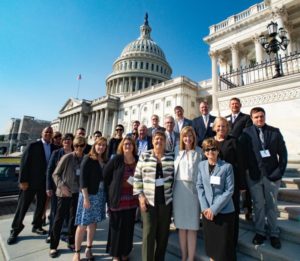
TRC’s Melissa SeitzMedford, CRP, GMS, Director, Consulting Services and Jerry Funaro, SCRP, SGMS-T, Vice President, Global Marketing were part of a Worldwide ERC® delegation on Capitol Hill on October 2. During Worldwide ERC Hill Day, delegates met with senior House and Senate staff, particularly those from their home states or the states where their companies are headquartered. They discussed several pending pieces of legislation that are of particular interest to companies that relocate employees. These include:
- 1302, H.R. 2521: Moving American Privacy Protection Act
Under the current statute, U.S. Customs and Border Protection (CBP) is required to make available to third-party data brokers the vessel manifest information of shipments arriving to the U.S. This can include personally identifiable information (PII), such as Social Security and passport numbers, home addresses and more. This legislation would allow CBP to remove the PII of military personnel and other transferees before making this information available to brokers. Worldwide ERC supports this legislation and we encouraged Representatives and Senators to co-sponsor and support the legislation.
- 386, H.R. 1044: Fairness for High-Skilled Immigration Act
The Fairness for High-Skilled Immigration Act would simply remove the current cap on the percentage of workers eligible for U.S. employment from any one country. It does not increase the absolute number of visas. Worldwide ERC® believes that businesses in the U.S. should have the flexibility to access high-skilled foreign workers based on the best fit of skill sets, regardless of their country of origin. This House of Representatives passed this bill overwhelmingly on July 10 but there currently is a hold on the legislation in the Senate.
- 604: Mobile Workforce State Income Tax Simplification Act
Employees, and their employers who conduct work in states other than where they reside, face tax filing and payroll issues due to a patchwork of different state laws on the taxation of their personal income. These differing approaches in state tax laws are burdensome for interstate commerce. The Mobile Workforce State Income Tax Simplification Act would provide a clear, uniform rule as to when states may begin to tax nonresident employees. Under the bill, employees who conduct work in a state for a minimum aggregate of 30 days would be subject to taxation by that state. Worldwide ERC supports this simplification and rationalization of interstate tax treatment. The legislation is opposed by several states that are aggressive in taxing visiting workers, particularly New York, so prospects are uncertain.
Reforming of Fannie Mae and Freddie Mac
The Trump administration recently released its plan to overhaul Fannie Mae and Freddie Mac. This does not relate to a specific piece of legislation, but it was nonetheless an important agenda item for the meetings. Fannie and Freddie were created by the federal government to help secure 30-year mortgages and to allow financial institutions to increase their lending. As many employee transfers involve buying and selling homes, it is critical for the mobility industry and transferees that there be stability within the mortgage market. One focus of the meetings was to underline the importance of maintaining liquidity within the secondary mortgage market and keeping interest rates affordable to make it possible for people to buy and sell homes across the country.
Said TRC President Sean Lickver, CRP, GMS, “One or more of these issues affect virtually all of TRC’s clients. I’m pleased that TRC had the opportunity for hands-on involvement in the legislative process and the chance to shape legislation in a way that advances the interests of our clients and their relocating employees.”




